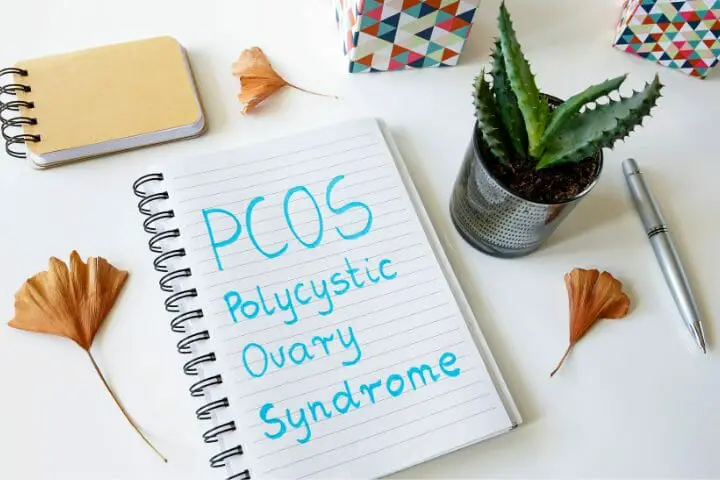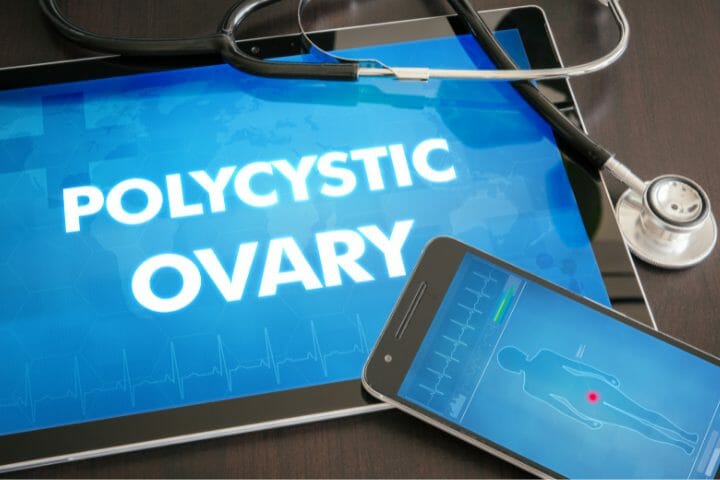PCOS impacts women of reproductive age in both a physical as well as mental form. But can you get disability for PCOS? Read on to find out how you can file a claim for disability with PCOS.
Contents
Do you know that PCOS affects 1 in 10 women during their reproductive age?
Yes, it is one of the most common hormonal imbalances in women during their childbearing age and can lead to severe conditions, including infertility and ovarian cancer.

Thus, despite being a common disorder, PCOS affects the physical, mental, and emotional health of a woman to the point that sometimes, it limits her earning capacity. So, can you get a disability for PCOS?
You definitely can, but there are certain rules that, if followed, can increase your chances of getting financial aid. In this article, we have discussed the same.
What is Polycystic Ovary Syndrome?
Polycystic Ovary Syndrome, commonly referred to as PCOS, is a hormonal disorder that affects women during their reproductive years. In most cases, the ovaries get enlarged and have multiple small cysts (unrelated to ovulation) that create hormonal imbalance in women. PCOS is relatively common in women these days and is, a treatable cause of infertility.
Some common symptoms of PCOS include:
- Too much facial or body hair in places where it is more common for men to have hair rather than women.
- Darkening of skin, particularly on the neck, under the breast, and groin
- Abnormal weight gain or loss
- Development of acne on the front, back, chest, etc.
- Irregular menstrual cycle
The exact cause of PCOS is still unknown, but as per experts, it is either due to high levels of androgen (male hormones) in women or high levels of insulin, whose resistance can lead to type 2 diabetes.
You might also like to read: If You Have Seizures Can You Get Disability?
What is the impact of Polycystic Ovary Syndrome on women?
PCOS has both short-term and long-term impacts on women. In a short time, it can lead to mood swings, decreased sexual satisfaction, weight gain, hirsutism (excessive hair growth), slow metabolism, etc.
It can also cause emotional stress and psychological distress in women. Women with PCOS have shown higher levels of depression and anxiety as well.
Amongst the long-term impact, PCOS can lead to the following conditions in life.
- Type 2 diabetes
- Cardiovascular diseases
- Hypertension
- Endometrial cancer
- Breast cancer
- Ovarian cancer
- Uterine cancer
- Sleep apnea
- Infertility
- Liver inflammation
It is to be noted that even though the experts are of the above opinion, there has been no conclusive research to prove the same.

Can You Get Disability for PCOS?
It is pretty rare for someone suffering from PCOS to get disability.
The basic eligibility to qualify for a disability is that the impairment must prevent you from doing substantial work. According to the social security administration (SSA), the maximum amount of work you need to do and be considered disabled is around $1300.
Another thing about getting a disability is that the impairment must have stopped you from working for at least 12 consecutive months. The symptoms of PCOS can be generally managed via exercise, lifestyle changes, and medication. So, it can be pretty hard to have job limitations for a whole year.
The SSA looks for the severity of the condition to give you disability benefits. PCOS alone cannot be as severe, and thus, you will have to use a combination of multiple medical conditions to be declared a disability.
If your current PCOS prevents or limits you from working and employment, it is time for you to apply for disability benefits.
You might also like to read: Can You Get Disability For Overactive Bladder?
How Can I Get Disability for My PCOS?
There are two disability programs of SSA that can get your disability benefits, namely –
- Social Security Disability Insurance (SSDI)
- Supplemental Security Income (SSI)
To meet the criteria of both programs, you must:
- Suffer from a medical condition that has already been diagnosed
- Have a state that has been present in your daily life for at least a year
If your circumstances meet the above criteria, you can go ahead with the application.
As mentioned already, PCOS, in most cases, cannot get your disability benefits. Thus, you will have to match the disorder with other conditions listed in the evaluation system of the SSA.
If your condition meets the medical condition listed in the listing, your benefit will be automatically approved. However, in the case, of PCOS, you will have to prove more than those conditions already listed in the disability evaluation system.
So, the next step would be to prove that your condition is so severe that it limits your ability or prevents you from working a job.

You will have to review your documentation under the guidelines listed in the Blue Book of SSA. Since PCOS is not listed in the book, you will have to determine the severity of your system by accomplishing the residual functional capacity (RFC) evaluation.
RFC is a detailed report that discusses the severity of PCOS and how it affects your day-to-day activity. It also outlines how your condition limits you mentally and physically from working a job.
If SSA finds out that you have the RFC to work your old or any other job in the US, it will deny the benefits to you.
Are there disorders or conditions associated with PCOS?
PCOS is associated with many long-term health risks and reproductive issues. Some of the significant health issues may include:
- Infertility
- Disorders of pregnancy
- Anovulatory cycles
- Liver inflammation
- Cardiovascular problems
- Type 2 Diabetes
- Metabolic syndrome
- Sleep apnea
- Depression
- Anxiety
- Breast cancer
- Ovarian cancer
- Uterine cancer
- Endometrial cancer
You might also like to read: If You Have Seizures Can You Get Disability?
Applying for Disability With Polycystic Ovarian Syndrome
We are now clear on the part that PCOS is not listed in the Blue Book of SSA’s disability evaluation system. To apply for PCOS disability, you will need to ‘match’ the symptoms with the condition listed in the schedule.
Following are a few conditions that you can combine with your disorder to get approval from the SSA:
- Liver inflammation – Section 5.05
- Sleep apnea – Section 310
- Type 2 Diabetes – Section 9.00
- Depression – Section 12.02
The medical records of your condition would include –
- X-rays, MRIs, and other reports
- Diagnostic tests and lab reports
- Medication and therapy are undertaken as per the physician’s prescription
- The doctor’s statement says how your condition prevents you from doing a day-to-day job
The SSA will review your application and your RFC and medical records and finally accept or reject the same.

Veteran Disability Ratings for Ovarian Cysts and Related Symptoms
The VA ratings for ovarian cysts do not depend on the cysts themselves but on the symptoms they produce. Thus, if a cyst is recurring but doesn’t show any signs, the rating will be 0%.
However, if the cysts are producing several symptoms or are enlarged, it can substantially limit a veteran’s ability to work. It can even lead to infertility and, thus, has a higher disability rate. Each symptom is rated separately, and then the final result is decided. Nausea, vomiting, abdominal pain, bladder urgency, swelling, etc., can be counted in the disability rating.
Typically, symptoms that do not require regular or continuous treatment get 0%, those with controlled yet continuous treatment get 10%, and severe symptoms that cannot be controlled get 30%.

Can I get disability compensation monthly payments or other benefits from VA related to PCOS?
Many PCOS-related medical services are provided by VA, including medication, infertility tests, maternity care, weight management, mental health treatment, etc.
You can also get disability compensation, monthly treatments, and other PCOS benefits from VA. However, you will have to apply for the same and documents and records that prove to you that the condition is severe, so much that it has prevented you from working in the last year.
The benefits apply to you only if the SSA approves your case.
You might also like to read: Can You Get Disability For Autoimmune Disease?
Other Conditions Similar to Polycystic Ovary Syndrome
Some conditions have almost the same symptoms as PCOS, but can you get disability for them. Let’s find out if the following similar conditions are listed in SSA’s Blue Book and whether they can be combined with PCOS to establish a robust application.

Can you get a disability for endometriosis?
Endometriosis doesn’t usually qualify for you to get disability benefits. However, the complications resulting from endometriosis can decide the course of the disability benefits. If the condition is so debilitating or severe that it limits your day-to-day functioning and prevents you from working, you may get a disability for endometriosis.
Can you get a disability for ovarian cysts?
You can get disability for ovarian cysts considering they are severe enough to cause health problems. If the condition is so severe that it limits the earning capacity and affects the woman’s quality of life, she can apply for disability benefits.

Can you get a disability for a pituitary tumor?
If you have been diagnosed with a pituitary tumor so severe that you cannot work and thus, have zero financial assistance, you can get a disability for it, and the SSA has a provision for the same under Listing 9.00 for pituitary gland disorders
Frequently Asked Questions
Can PCOS affect work?
In most cases, PCOS doesn’t affect a woman’s working life. However, there is no empirical evidence to prove the same. It can be difficult for a woman suffering from PCOS to show up every day, considering the imbalance affects them on a physical, mental, and emotional level.
Will removing ovaries help Polycystic Ovary Syndrome?
Removal of ovaries will not help in healing PCOS in women. It may, however, reduce the production of androgen to a certain level. PCOS doesn’t only affect the ovaries but various functions of the body. Thus, only removing ovaries won’t help.
Is PCOS considered a chronic illness?
PCOS is a life-long disorder and thus, can be considered a chronic illness. The cause and the full impact of PCOS on a woman’s body is unclear, but it affects various organs and hormones.
A Few Final Words
Once the application is submitted, there is a mandatory wait of about four months. Even if your application is accepted before four months, the help will start reaching you only after the end of the waiting period. However, it can take as long as a year before you hear from the SSA.
Hence, it is important for you to get the application right the first time and get the benefits that you need. We hope we have been able to give you the required guidance and direction to proceed. We would also encourage you to talk to a good disability lawyer. Thank you for reading, and as always, please write to us if you need any further help.
